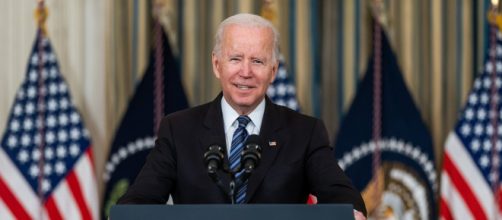Americans may have to cope with cyberattacks and higher gas prices in the event of a Russian invasion of Ukraine, President Joe Biden warned on February 15. He said negotiations were continuing between the U.S. and Russia, but an attack against the Ukraine "remains distinctly possible." That same day, the websites of the Ukrainian defense ministry and two banks suffered cyberattacks from unknown sources, according to Reuters.
Directing his words towards the Russian people, Biden said: "You are not our enemy. And I do not believe you want a bloody, destructive war against Ukraine."
The U.S.
is ready to respond if Russian President Vladimir Putin launches "disruptive cyberattacks against our companies or critical infrastructure," Biden said. He added that the U.S. and its allies are working "to deepen our collective defense against threats in cyberspace."
The President also warned that an invasion might "impact on our energy prices, so we are taking active steps to alleviate the pressure on our own energy markets and offset rising prices." The Biden Administration would use "all the tools and authority at our disposal to provide relief at the gas pump," he said.
"The United States is prepared no matter what happens," Biden said. His speech can be seen on the White House website and YouTube channel.
Cyberattacks from unidentified sources
On the day of Biden's remarks, Reuters reported that an overwhelming flood of traffic had disrupted access to the Ukrainian defense ministry's website. On the same day, two Ukrainian banks had fallen victim to this type of cyberattack, known as a distributed denial-of-service attack, Reuters said.
The news agency said that the perpetrators of the attack had yet to be identified. John Hultquist of the cybersecurity company Mandiant told NPR that distributed denial-of-service attacks were "notoriously difficult to attribute."
The embassy moved out of Kyiv
The President said the American embassy had been temporarily moved out of the Ukrainian capital Kyiv to Lviv, near the border with NATO ally Poland.
He noted that he had asked Americans in Ukraine to "leave now before it's too late to leave safely." However, the New York Times noted that Biden had not yet sent an ambassador to Ukraine. The paper said that the position had been vacant since Donald Trump's dismissal of Ambassador Marie Yovanovitch in 2019.
Russian invasion would be a 'self-inflicted wound'
In his remarks, Biden recalled that "the worst war in history" had united Americans and Russians against Hitler. "World War II was a war of necessity. But if Russia attacks Ukraine, it would be a war of choice," the President said. He added, "Invading Ukraine will prove to be a self-inflicted wound."
Stoltenberg sees the buildup of Russian forces
On the day following Biden's statements, NATO Secretary-General Jens Stoltenberg said that Russia was continuing to amass its forces near the border with Ukraine, what contradicts Putin's claim of a partial withdrawal of military forces.
Stoltenberg was in Brussels for a meeting of NATO's 30 defense ministers. The Guardian quoted Canadian Defense Minister Anita Anand as saying the buildup of Russian forces was "increasingly significant."


